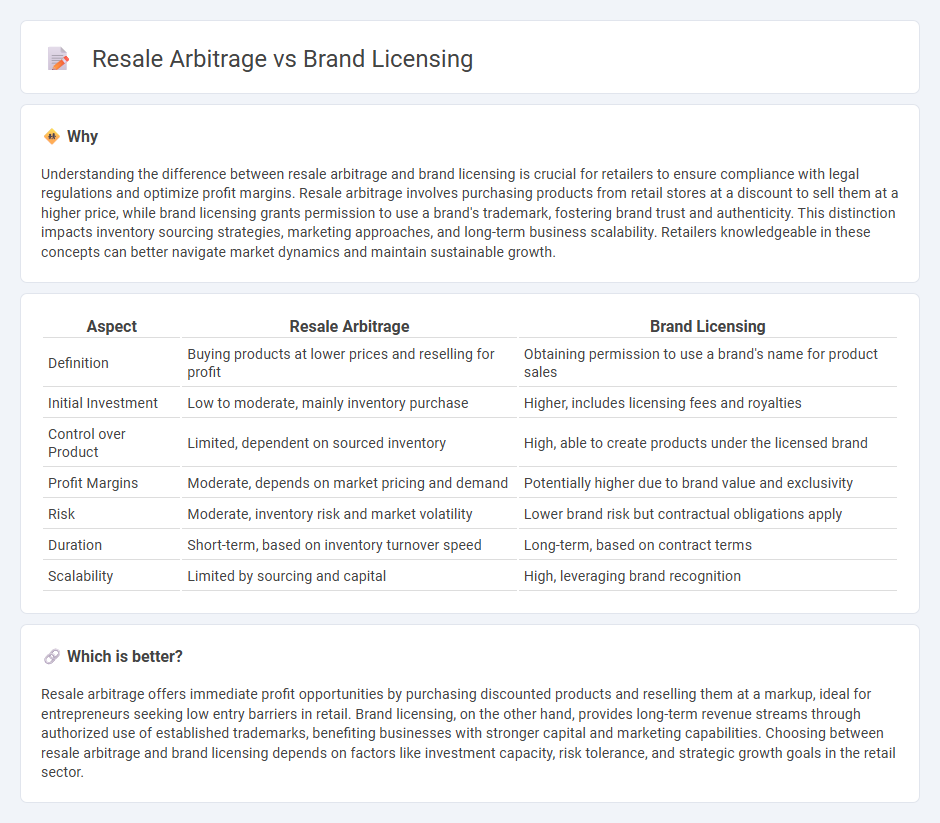
Resale arbitrage involves purchasing products at a lower price from one market and selling them for profit in another, capitalizing on price differences and demand fluctuations. Brand licensing allows retailers to legally sell products under a recognized brand, paying fees or royalties, which enhances market credibility and consumer trust. Explore further to understand how each strategy can optimize retail profitability and growth.
Why it is important
Understanding the difference between resale arbitrage and brand licensing is crucial for retailers to ensure compliance with legal regulations and optimize profit margins. Resale arbitrage involves purchasing products from retail stores at a discount to sell them at a higher price, while brand licensing grants permission to use a brand's trademark, fostering brand trust and authenticity. This distinction impacts inventory sourcing strategies, marketing approaches, and long-term business scalability. Retailers knowledgeable in these concepts can better navigate market dynamics and maintain sustainable growth.
Comparison Table
| Aspect | Resale Arbitrage | Brand Licensing |
|---|---|---|
| Definition | Buying products at lower prices and reselling for profit | Obtaining permission to use a brand's name for product sales |
| Initial Investment | Low to moderate, mainly inventory purchase | Higher, includes licensing fees and royalties |
| Control over Product | Limited, dependent on sourced inventory | High, able to create products under the licensed brand |
| Profit Margins | Moderate, depends on market pricing and demand | Potentially higher due to brand value and exclusivity |
| Risk | Moderate, inventory risk and market volatility | Lower brand risk but contractual obligations apply |
| Duration | Short-term, based on inventory turnover speed | Long-term, based on contract terms |
| Scalability | Limited by sourcing and capital | High, leveraging brand recognition |
Which is better?
Resale arbitrage offers immediate profit opportunities by purchasing discounted products and reselling them at a markup, ideal for entrepreneurs seeking low entry barriers in retail. Brand licensing, on the other hand, provides long-term revenue streams through authorized use of established trademarks, benefiting businesses with stronger capital and marketing capabilities. Choosing between resale arbitrage and brand licensing depends on factors like investment capacity, risk tolerance, and strategic growth goals in the retail sector.
Connection
Resale arbitrage leverages brand licensing by legally acquiring rights to sell branded products at discounted prices, enabling sellers to profit from price differences in various markets. Effective brand licensing agreements ensure authenticity and compliance, essential for successful resale arbitrage operations. This connection enhances market opportunities while protecting brand value and consumer trust in the retail sector.
Key Terms
Intellectual Property
Brand licensing grants authorized use of intellectual property, such as trademarks and copyrights, under specific terms, allowing licensees to produce or sell branded products legally. Resale arbitrage involves purchasing genuine branded goods to resell at a higher price without altering the IP rights but may risk violating brand agreements if unauthorized channels are used. Explore detailed insights on how intellectual property impacts brand licensing and resale arbitrage strategies.
Authorized Distribution
Authorized distribution plays a crucial role in brand licensing by granting licensees the legal right to produce and sell products under a brand name, ensuring compliance with trademark laws and maintaining brand integrity. In resale arbitrage, sellers purchase products from authorized distributors or retailers and resell them, often capitalizing on price discrepancies without direct licensing agreements. To better understand the legal and operational differences between brand licensing and resale arbitrage within authorized distribution frameworks, explore detailed industry guidelines and case studies.
Secondary Market
Brand licensing allows authorized dealers to sell products under a brand's name, ensuring authenticity and controlled pricing in the secondary market. Resale arbitrage involves purchasing items at a lower price and reselling them for profit, often resulting in variable product quality and brand perception. Discover more about how these strategies impact secondary market dynamics and profitability.
Source and External Links
The Ultimate Guide to Brand Licensing - Brand licensing involves granting permission to third parties to use a brand's intellectual property under agreements, expanding a brand's reach, increasing sales, and enhancing consumer awareness while protecting brand equity.
Brand Licensing: Opportunities, Risks and Best Practices - Licensing your brand can generate passive income with proper planning and legal agreements that cover exclusivity, royalties, quality control, liability, and exit strategies to protect your brand's reputation.
Brand Licensing: How it Works, Benefits & Examples (2025) - Brand licensing allows another company to use your intellectual property in return for fees or royalties, enabling brand growth, product expansion, and protection against counterfeiting within a $533.9 billion industry by 2033.
 dowidth.com
dowidth.com